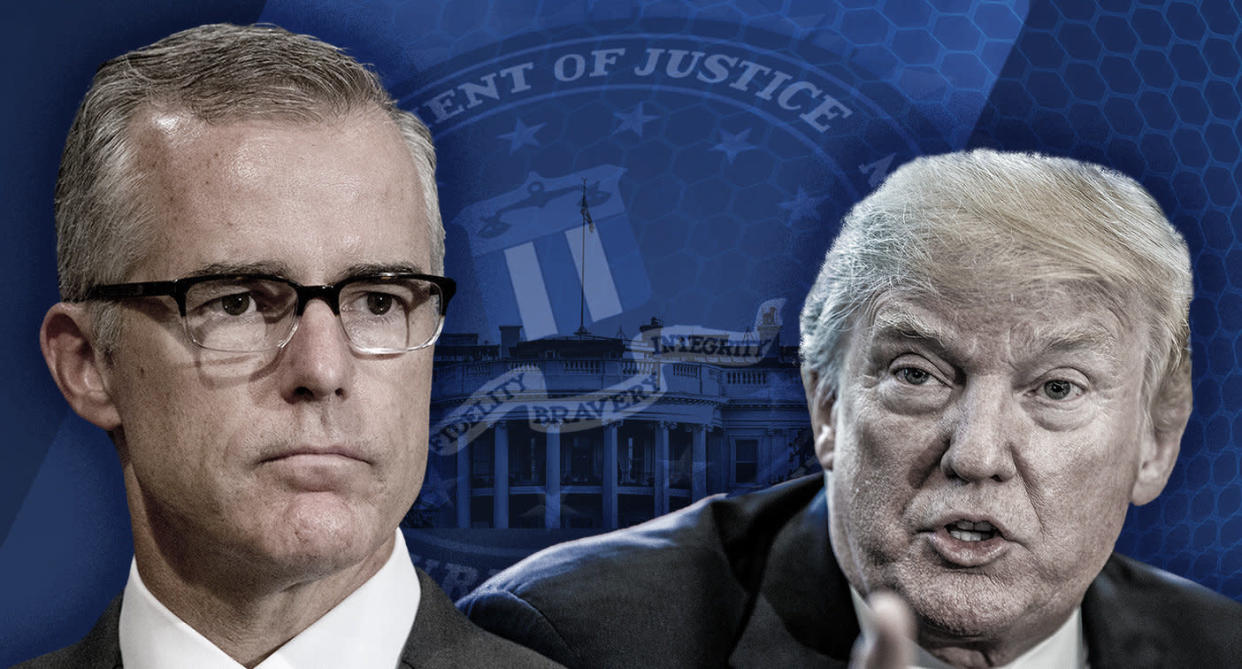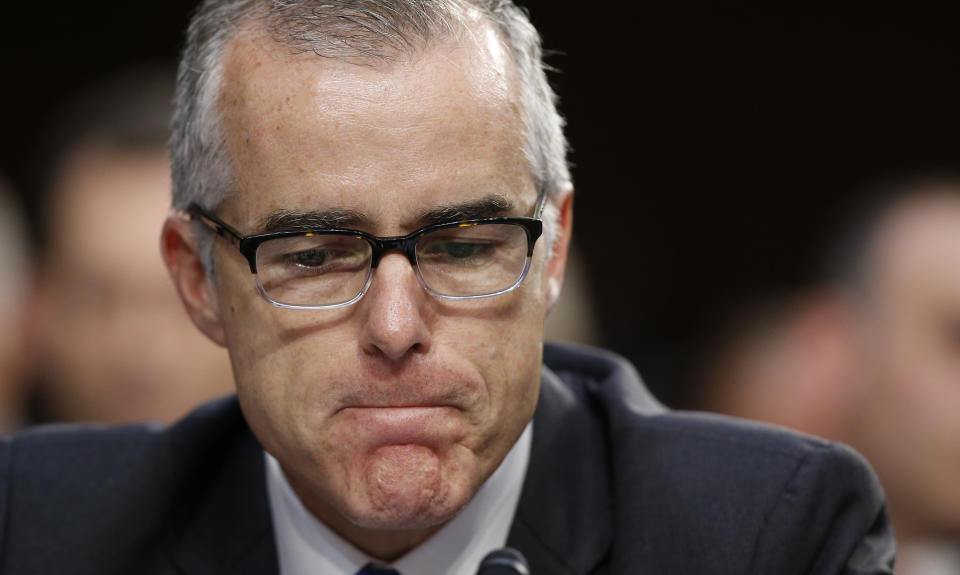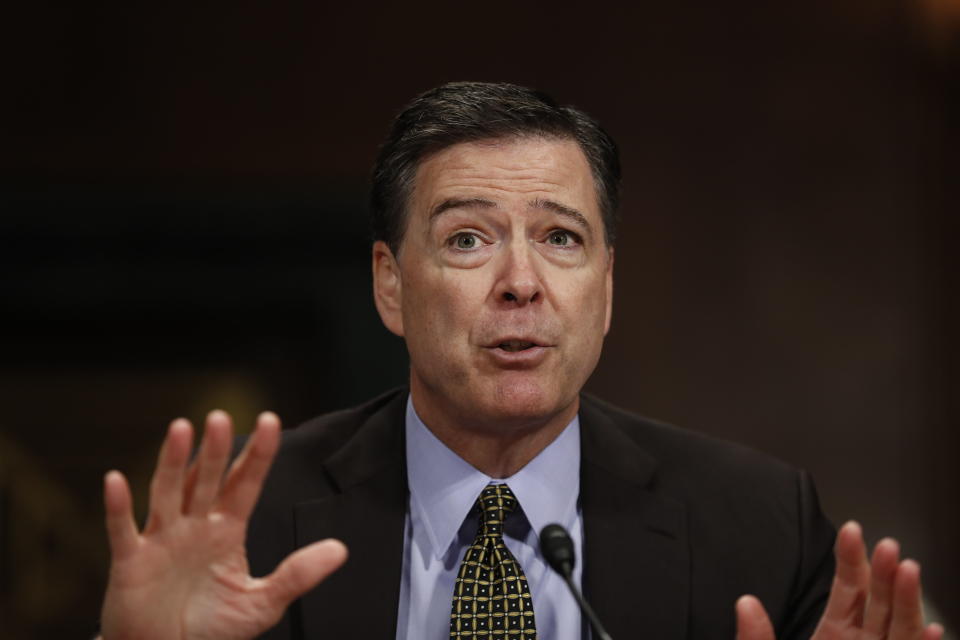Andrew McCabe exacts tell-all revenge on Donald Trump

In the early days of Donald Trump’s presidency, then Deputy FBI Director Andrew McCabe was summoned to the White House to discuss a highly sensitive national security investigation.
Little did he imagine he was about to wander into a Mel Brooks movie. At least that is how McCabe depicts the meeting in one of the more curious scenes in his headline-grabbing new book, “The Threat: How the FBI Protects America in the Age of Terror and Trump.”
The meeting in question came at an unusually tense moment. The FBI had just concluded that national security adviser Michael Flynn had lied to agents about his conversations with the Russian ambassador to the United States. Then chief of staff Reince Priebus, accompanied by White House counsel Don McGahn and other staffers, demanded that McCabe show him the evidence.
But then, as McCabe relays it, the senior White House officials “got distracted” by the TV in the room, which was airing a breaking news story about events in the White House.
“Everyone turned toward the screen and they all began to talk about the story, which they said had been leaked,” writes McCabe. He can’t remember what the story was about “only how much it upset them. They had a heated conversation.”
While the top White House officials angrily debated who had leaked the story, McCabe just sat there, waiting patiently for the argument to finish so the meeting could get back to what he had been called to discuss: whether the national security adviser to the president had been compromised by the Russians.
If the scene sounds surreal and richly comical, it is only one of many such moments scattered throughout McCabe’s memoir. Written in a dry, just-the-facts tone, it portrays an administration whose top officials were petty, volatile, indecisive and obsessed with prejudices and preconceived notions that made them impervious to rational argument or actual evidence.

Much has already been written and said about the author’s scathing portrait of President Trump. The day after firing McCabe’s boss, James Comey, Trump called up McCabe — the new acting director — and in the course of a rambling conversation erupted in anger over the fact that Comey was permitted to fly back from Los Angeles on a government plane. Trump demanded that Comey be “banned” from retrieving his personal effects from the FBI building and improbably insisted, according to McCabe's retelling of events, that he had received “hundreds of messages” from FBI employees expressing how happy they were that he had gotten rid of Comey. Trump then called McCabe’s wife a “loser” for being beaten in a race for the Virginia state Senate.
Less has been said about McCabe’s more subtle moves to undermine the president, separate and apart from launching a counterintelligence investigation to determine if Trump was a Russian asset. McCabe writes that he was aghast when Trump declared he wanted to come to the J. Edgar Hoover Building to talk to the FBI rank and file. Contrary to Trump’s firm belief, McCabe said he knew that most of the FBI troops were demoralized by Comey’s firing and deeply resented the dismissal of the popular director. McCabe suggested Trump come two days later and speak in the courtyard, knowing the weather forecast called for rain.
But McCabe’s depiction of Trump’s first attorney general, Jeff Sessions, may be the most damning aspect of the book. Sessions, according to McCabe, showed no interest in the regular national security briefings he would receive from the FBI. He wouldn’t open up written briefs sent to him on a secure tablet, looked visibly bored during in-person sessions and would confuse classified information with tidbits he read in the newspapers. Sessions barely hid his personal prejudices – referring to the many Irish-American “drunks” the FBI used to hire — and knew little about how federal law enforcement actually works. When briefed about Colombian drug trafficking, the AG went “apoplectic” and demanded to know why the FBI wasn’t deploying more boats to stop the shipments, apparently unaware that the bureau has no fleet of boats. It is the Coast Guard, not the bureau, that has ships to interdict drug shipments at sea.
Sessions obsession was immigration, and he would constantly interrupt his FBI briefings with inappropriate questions, McCabe writes, wanting to know the nationality and country of origin of terrorism suspects and other criminal suspects.
How many counter-terrorism cases did we have against immigrants? Sessions would ask in McCabe's retelling. (We don’t tally them that way, McCabe would patiently explain.) Sessions would get red-faced and angry at times, demanding to know why the FBI was reading Miranda rights to overseas terror suspects. He expressed impatience with the FBI’s efforts to find a former agent, Robert Levinson, who had gone missing in Iran. “How much longer are we going to do this? How much money are we going to spend on this?” McCabe quotes Sessions as saying.
According to McCabe, Sessions even seemed to question why the FBI bothered to search for other Americans detained or being held hostage overseas at all. “The implication was that some of these people had it coming: If you traveled to Iran and then found yourself locked up, it was your own damn fault,” McCabe wrote.

Rod Rosenstein, the deputy attorney general, comes off as a tortured, Hamlet-like figure. In the critical days after Comey’s firing, Rosenstein — in McCabe’s telling — was confused, distracted and demoralized. He waffled about appointing a special counsel to oversee the Russia probe. Rosenstein grew emotional and a “little glassy-eyed” after discovering that Trump had used Rosenstein's memo as the basis for firing Comey. The deputy attorney general wanted outside advice and “incredibly,” according to McCabe, tells him that the one person he really wanted to talk to about the situation was Comey, the man he had just helped Trump fire.
Even Robert Mueller doesn’t get off entirely scot free. McCabe’s portrait of the stern, no-nonsense Mueller is priceless. As FBI director, Mueller — with his starched white shirts and Marine lieutenant demeanor — was intimidating and “ball-busting.” In briefings, writes McCabe, Mueller “would eviscerate people who did not know what they were talking about” or “hadn’t followed up on things that he’d asked them about.”
In a previously unknown anecdote, McCabe describes how, after Comey’s firing, Mueller himself was called to the White House to be interviewed by Trump about returning to his former job as FBI director. He didn’t get the job. After leaving the interview, an awkward problem developed. Mueller had left his cellphone behind. The matter was brought to the attention of Rosenstein, who had to arrange to retrieve Mueller’s cellphone from the Oval Office.
There is much that readers won’t learn from McCabe’s book: What exactly was the evidence that prompted the FBI to launch its investigation into the Trump campaign in the first place? What criteria did McCabe use to initiate the later counterintelligence probe, and — even more importantly — what did the bureau learn after the investigation began that either supported or contradicted McCabe’s initial assessment that Trump might be acting as a Russian asset? There is also precious little about McCabe’s own lapses, such as misleading federal investigators on four occasions about his role in authorizing the disclosure of information for a news story. It was that finding, by the Justice Department inspector general, that prompted McCabe's firing last March, less than 24 hours before he was set to retire and start receiving his FBI pension.
_____
Read more from Yahoo News:
Ann Coulter: ‘Lunatic’ Trump could be challenged in 2020 — from the right
As concerns grow about faltering U.S. support for UAE, China steps in to fill the void
Habitat for sale: An oil and gas group calls the tune at the Interior Department
Crackdown on opioids has its own victims: People who need them to live
As 5G war with China heats up, could a Cold War-inspired plan be the solution?



